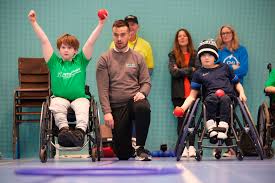The Role of Sports in Building Lifelong Healthy Habits

Sports play an essential role not just in physical fitness but in helping people cultivate lifelong habits that benefit overall well-being. From discipline to teamwork and mental toughness, engaging in sports teaches values and skills that extend well beyond the field or court. With the added influences of modern technology, new sporting trends, and community programs, sports have become a powerful tool for promoting health, education, and personal development across all ages and skill levels.
1. Physical Fitness: A Foundation for Health
One of the most apparent benefits of participating in sports is improved physical fitness. Regular exercise through sports helps develop cardiovascular strength, build muscle, and boost overall stamina. These foundational elements of health can lead to a reduced risk of chronic conditions like heart disease, diabetes, and high blood pressure.
a. Developing Strength and Stamina
For many, engaging in sports provides a structured way to develop physical strength and stamina. Sports like swimming, running, and cycling are popular choices because they offer cardiovascular benefits and can be done both individually and in groups. Team sports like soccer, basketball, and hockey add the element of competition, pushing participants to strive for continuous improvement.
b. A Healthy Routine
Participating in sports encourages people to develop a regular exercise routine, a habit proven to be effective in sustaining long-term health. Many people find it easier to stick with a workout routine when it is structured, enjoyable, and social. Regular training and practice sessions create positive routines, making it easier for people to integrate physical activity into their daily lives.
2. Building Mental Resilience and Discipline
Sports are as much about mental endurance as they are about physical performance. Athletes at any level are required to develop discipline, set goals, and face challenges head-on. These lessons are invaluable, promoting resilience that can benefit many aspects of life beyond sports.
a. Goal-Setting and Persistence
Whether it’s aiming to improve a personal record in a marathon or working toward a team championship, sports teach the importance of setting realistic goals and persistently working toward them. This ability to set and pursue goals is essential for personal growth and success in any area of life, from academics to career advancement.
b. Dealing with Wins and Losses
Sports instill a balanced perspective on success and failure. Experiencing losses or setbacks in sports teaches people to accept failure as part of the journey and an opportunity to learn. This resilience can help individuals handle challenges in other areas of life, as well, by developing coping skills that support long-term mental health.
3. Social Skills and Teamwork
Sports provide a unique environment for learning social skills and fostering teamwork. Working with others toward a common goal helps build trust, communication, and collaboration skills. Sports encourage individuals to understand different roles, contribute to a team, and respect others’ strengths and weaknesses.
a. Collaboration and Cooperation
In team sports, players must work together to strategize and make split-second decisions. Effective teamwork in sports translates to valuable skills for personal and professional life, teaching people how to work cohesively, support others, and share success. Team sports such as soccer, volleyball, and basketball are particularly effective in building these skills, as they require constant communication and coordination.
b. Fostering Community and Belonging
For many, sports provide a sense of belonging and community. Local leagues, school teams, and even neighborhood pickup games create social networks that bring people together. Sports communities can also extend beyond the field, as many participants form friendships that last well into adulthood. These communities create a support system that promotes social interaction and helps reduce loneliness and social isolation.
4. Technology’s Role in Promoting Healthy Habits
With the rise of digital health tools and wearable devices, technology is making it easier than ever for people to maintain healthy habits through sports. From fitness tracking apps to online communities, technology is transforming the way people participate in and stay motivated for sports.
a. Wearable Fitness Devices
Wearable fitness devices such as smartwatches and heart rate monitors help athletes track their physical activity, monitor health metrics, and set goals. These tools enable athletes to stay aware of their health and make adjustments to their training routines. Many wearable devices provide feedback on metrics like heart rate, sleep patterns, and calorie burn, giving users a comprehensive understanding of their progress and areas for improvement.
b. Online Sports Communities
Online platforms and communities allow people to connect over shared interests in specific sports. Apps like Strava and RunKeeper not only track individual performance but also provide a social network where users can share accomplishments, set goals, and encourage each other. For those new to sports, these communities offer inspiration, advice, and support to make the experience more enjoyable.
c. Virtual Coaching and Training Programs
Many apps offer access to virtual coaching and training programs, making it easier for people to find guidance and structure in their exercise routines. Some programs are personalized, adjusting based on fitness level and goals, which allows both beginners and experienced athletes to benefit. Virtual training also makes it easier to train at home, eliminating common barriers like gym accessibility or time constraints.
5. The Impact of Sports on Youth Development
Engaging in sports from a young age has a profound impact on youth development. It fosters skills and values that can benefit children throughout their lives, helping them develop positive habits, social skills, and a strong sense of self.
a. Boosting Confidence and Self-Esteem
For young athletes, sports provide an opportunity to learn and grow in a supportive environment. Mastering new skills, contributing to a team, and achieving personal goals all boost self-confidence and self-esteem. Encouraging children to participate in sports can help them develop a positive self-image and resilience that carries over into other areas of life.
b. Promoting Academic Success
Studies have shown that children involved in sports tend to perform better academically. The discipline and time management skills required in sports help children develop effective study habits. Additionally, participation in sports is associated with higher levels of concentration, better attendance rates, and improved cognitive skills.
c. Reducing Negative Behaviors
Engagement in sports has also been linked to a decrease in negative behaviors among youth. The structure, discipline, and support provided by sports teams offer positive outlets for energy and focus, helping to reduce the likelihood of risky behaviors. Coaches, teammates, and mentors provide valuable guidance and role models that positively impact young athletes’ choices and habits.
6. Sports as a Means of Lifelong Learning
Beyond the physical and social benefits, sports offer a valuable form of lifelong learning. Participating in sports teaches resilience, adaptability, and a growth mindset, all qualities that are essential for personal development and success.
a. Learning New Skills at Any Age
Engaging in sports offers lifelong learning opportunities, with many people taking up new activities like yoga, hiking, or cycling well into adulthood. Learning a new sport or skill fosters brain health, as it challenges the mind and promotes neuroplasticity, or the brain’s ability to adapt and form new connections.
b. Adaptability and Overcoming Challenges
In sports, individuals learn to adapt to new situations, whether it’s adjusting tactics during a game or persevering through difficult training. This adaptability is a skill that transfers to various aspects of life, from problem-solving to professional work environments. Through sports, people learn that challenges are part of the journey and that perseverance is essential for growth.
7. Making Sports a Part of Everyday Life
Incorporating sports into everyday life can bring immense physical, mental, and social benefits. To make sports a sustainable part of one’s routine, it is essential to find an activity that’s enjoyable and manageable.
- Start Small: Begin with achievable goals, like a short walk or a weekly basketball game, then gradually increase your activity level.
- Find a Sport You Enjoy: Choosing a sport you enjoy increases motivation and consistency.
- Build a Support System: Joining a team or finding a workout partner can provide accountability and make the experience more enjoyable.
- Use Technology: Track your progress, set reminders, and engage with online communities to stay inspired.
- Keep it Fun: Remember, the goal is lifelong wellness—focus on the enjoyment and personal growth that comes from sports.
Conclusion: Sports as a Pathway to a Balanced Life
Sports are not just a means of exercise; they are a pathway to building lifelong healthy habits that positively impact physical, mental, and social well-being. Through structured routines, teamwork, and personal goals, sports teach valuable life skills and foster connections that contribute to a balanced and fulfilling life. With the added convenience of technology and the accessibility of various sports, incorporating physical activity into daily life has become easier and more enjoyable than ever. As people continue to embrace sports as a tool for personal growth and community building, the future promises a healthier and more connected world.





